Politics

From Left: Bangladesh Foreign Secretary Masud Bin Momen and Chinese Vice Minister for Foreign Affairs Sun Weidong. Photo: Collected
China keen to import mango, other agricultural products from Bangladesh
Chinese Vice Minister for Foreign Affairs Sun Weidong has appreciated Bangladesh's interest to join BRICS for which he assured of China's active support.
In 2006, Brazil, Russia, India and China created the "BRIC" group. South Africa joined in 2010, making it "BRICS". Egypt, Ethiopia, Iran, Saudi Arabia and the United Arab Emirates (UAE) were invited to become members with effect from 1 January 2024.
During the 13th round of bilateral political consultations between Bangladesh and China held in Beijing on June 3, both parties agreed to work jointly for the upcoming visit of Prime Minister Sheikh Hasina to China next month.
Foreign Secretary Masud Bin Momen led the Bangladesh delegation while the Chinese side was led by the Vice Minister for Foreign Affairs Sun Weidong.
The Bangladesh delegation comprised of Ambassador of Bangladesh to China Jashim Uddin, Additional Secretary of ERD Anwar Hossain and officials from the Foreign Ministry and Bangladesh Embassy in China.
Officials from Foreign Ministry of China were present on the other side.
The consultations focused on consolidating bilateral relations, enhancing economic ties, promoting trade and investment and exploring opportunities for cooperation in multilateral platform, according to the Ministry of Foreign Affairs.
The Chinese vice minister underscored the importance of high-level exchanges and people-to-people connectivity.
He conveyed China's willingness to work together to import mango and other agricultural products from Bangladesh and also to assist skill development of the youth. The Chinese side assured to expedite the repatriation of the Rohingyas sheltered in Bangladesh.
Weidong mentioned that the two countries' embassies in Dhaka and Beijing may work together for the celebration of 50 years of diplomatic ties between the two countries.
Foreign Secretary Masud mentioned that Bangladesh attaches significant importance to its relations with China based on shared values, mutual respect and common aspirations.
He recalled the visit of the Father of the Nation Bangabandhu Sheikh Mujibur Rahman to China during 1952 and 1957 and expected the book "The New China as I saw" to be published in Chinese language before the upcoming VVIP visit.
The foreign secretary highlighted the visit of President Xi Jinping to Bangladesh in 2016 which uplifted the relation to "Strategic Partnership of Cooperation".
Bangladesh foreign secretary thanked China for their support in infrastructural development which includes several mega projects.
He explained the growing economy of Bangladesh and sought China's support to facilitate the existing structure of Duty-Free Quota Free (DFQF) access of Bangladeshi products in China.
Masud put emphasis on global cooperation to overcome challenges like pandemic, climate change etc.
He expressed expectation for China's continued support for the safe and voluntary repatriation of the Rohingyas sheltered in Bangladesh to their homeland.
Chinese Vice Minister Weidong welcomed Bangladeshi delegation and expressed his deepest sympathy for the damage incurred by the recent cyclone "Remal".
He congratulated the prime minister of Bangladesh for being re-elected through the national election on 7 January and hoped that under her capable leadership, the Bengali nation will fulfill the dream of "Sonar Bangla".
He recalled Bangladesh prime minister's visits to China since 2010 and her discussion with the Chinese president during last year's BRICS summit.
The two sides agreed to hold the next bilateral political consultations between the two foreign ministries next year in Dhaka.
The two sides believe that China and Bangladesh are good neighbors, good friends and good partners with similar development concepts and compatible development strategies, according to the Embassy of China in Dhaka.
Two countries have always respected each other, treated each other as equals, and achieved mutual benefit and win-win results, it said.
They have supported each other on issues concerning each other's core interests, and worked hand in hand on the path of modernization that suits their respective national conditions, setting an example for friendly cooperation among developing countries.
The two sides stressed that the China-Bangladesh strategic cooperative partnership has been continuously deepened, and fruitful results have been achieved in practical cooperation in various fields.
The two sides will implement the important consensus reached by the leaders of the two countries, uphold the spirit of the Five Principles of Peaceful Coexistence, deepen political mutual trust, strengthen the docking of development strategies, carry forward traditional friendship, jointly build the "Belt and Road" with high quality, accelerate the implementation of the "Three Global Initiatives", and promote China-Bangladesh relations to a new level.
The two sides also exchanged views on international and regional issues of common concern.






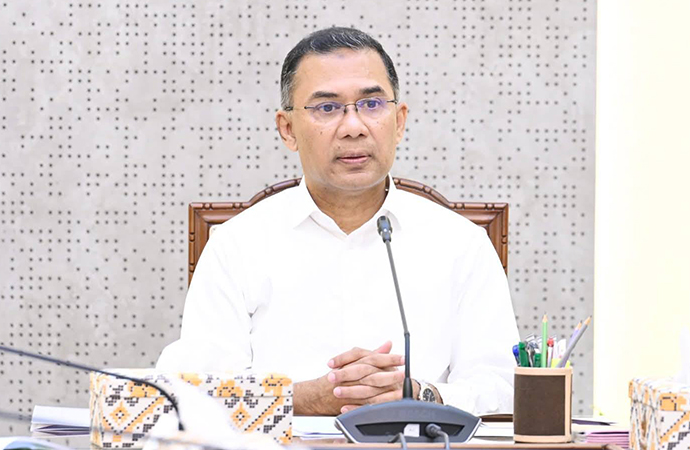
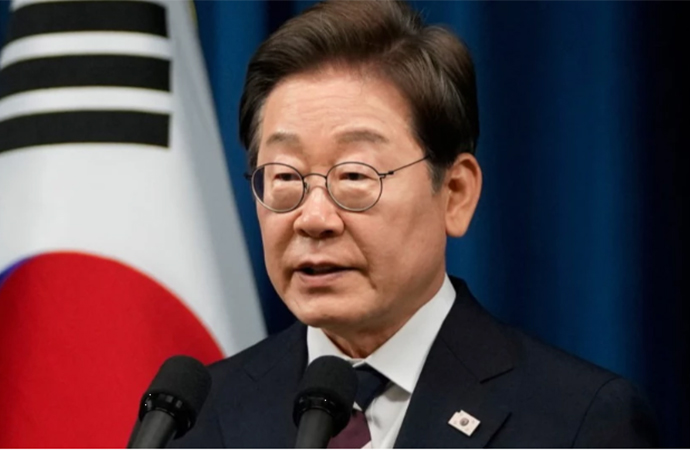
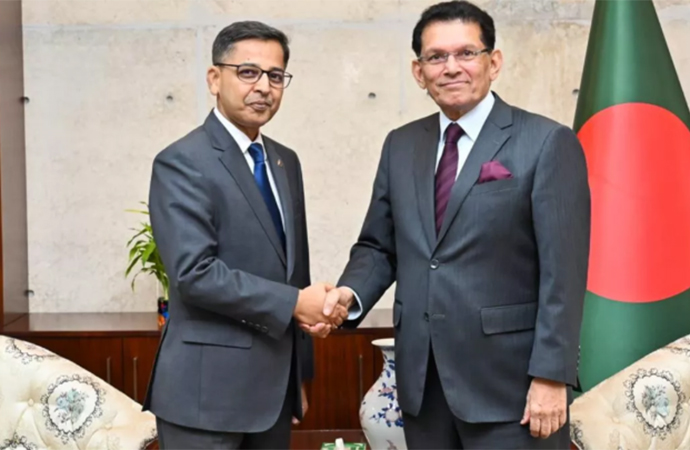
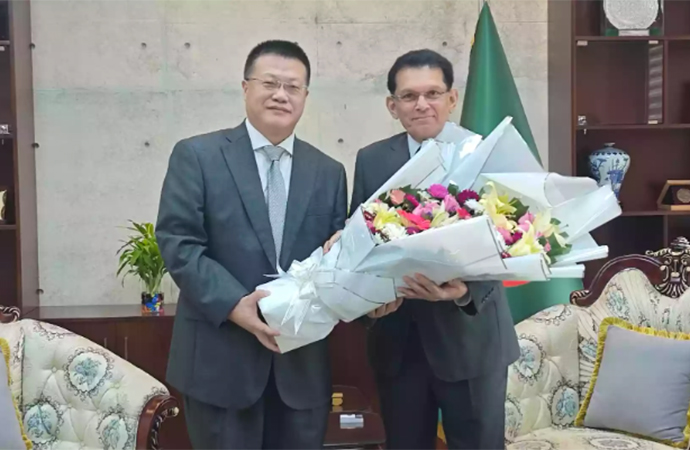
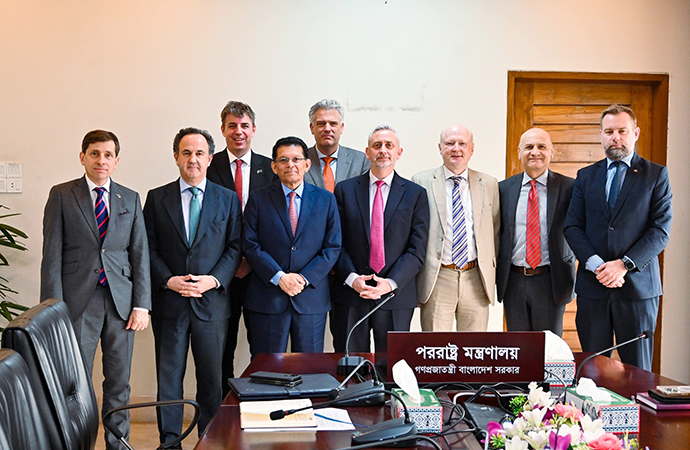
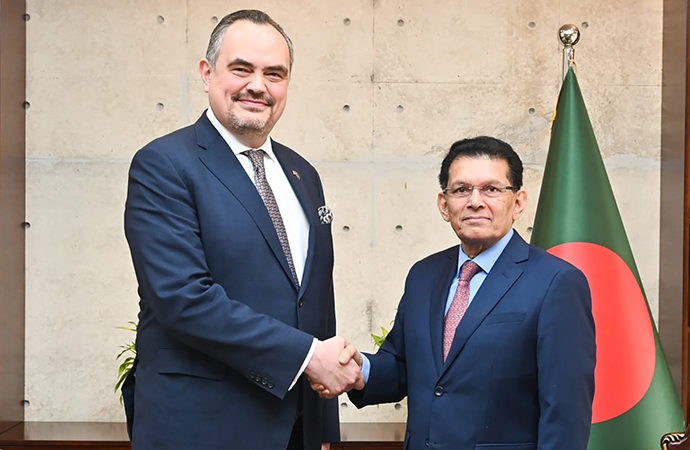













Leave a Comment
Recent Posts
Bangladesh’s first drought-res ...
In a groundbreaking development for Bangladesh’s agriculture, Ga ...
US and Iran hold another round ...
Iran and the United States were holding another round of indirect talk ...
An early hiccup for the new government?
Japan invites PM Tarique, eyes cooperation with Bang ..
Bangladesh to achieve sustained growth, prosperity u ..
Dhaka indicates ‘forward looking, balanced partnersh ..